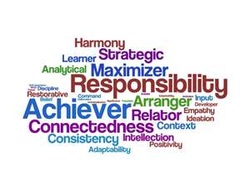|
|
|
Strengths-Based Coaching : Start with Talents, End with Strengths.

The best coaches focus on strengths. The best coaches help others open the door to their potential. For people to become more of who they already are and be at their best, they must gain a clear understanding of themselves - how they naturally think. feel, and behave. People's greatest talents - the ways in which they naturally think, feel, and behave - represent their innate power and potential. When people can tap into these natural patterns, they act with more capability, confidence, happiness, direction, hope, and authenticity. Too often, people take their talents for granted. They assume everybody has what they have. Or perhaps worse, they are not aware of their talents or their potential.
Coaches have their own individual approaches to what they do and how they do it. But, decades of Gallup research into talents, coaching, and success have shown that the best coaching is grounded in a handful of guiding principles.
As a strengths coach, my role is to deliver key messages that sound like this :
Coaches have their own individual approaches to what they do and how they do it. But, decades of Gallup research into talents, coaching, and success have shown that the best coaching is grounded in a handful of guiding principles.
- First, when coaching from a strengths perspective, you must have an intense, intentional focus on the positive, natural potential and tendencies of the client : The goal of strengths-based coaching is leveraging the client's natural talents in a productive way so that they truly become strengths. Consequently, the coach looks for the best in his or her client and helps him or her understand, appreciate, and apply the unique and enduring qualities that he or she already possesses.
- Second, strength coaches should spend more time studying success than failure : Essentially, they will find success more interesting and engaging than failure. Ultimately they know that they will get a bigger return on the time and energy they invest in studying success.
- Third, strengths coaches must understand that a focus on strengths does not mean totally ignoring a person's weaknesses : Effective coaches are aware of and discuss their client's potential weaknesses. However, they don't allow their client to obsess or concentrate on them. They help their client find ways to manager around or mitigate these potential hindrances and then return to a focus on talents that can be converted to strengths.
As a strengths coach, my role is to deliver key messages that sound like this :
- You don't have to become a different person to be successful.
- You don't have to be all things to all people.
- You can't be anything you want to be, but you can be more of who you are.
- You can learn how to be more of who you already are and how to be a better version of who you already are.
|
|
Joseph Tan is the first Gallup-Certified Strengths Coach in Malaysia after attending the pioneering Accelerated Strengths Coaching Program conducted by Gallup for the first time in Asia. As a certified Gallup Strengths Coach, Joseph offers a systematic and proven approach to train, consult and coach your organization towards developing a strengths based culture.
Click here for Gallup's strategic consulting roadmap towards achieving higher levels of performance. In addition to strengths-based coaching, Joseph also focuses on consulting with organizations to improve employee engagement using Gallup's proprietary Q12 engagement metrics. Engagement is key to sustainable performance and growth. Click here to gain access and information to Gallup's powerful Q12 engagement survey. |